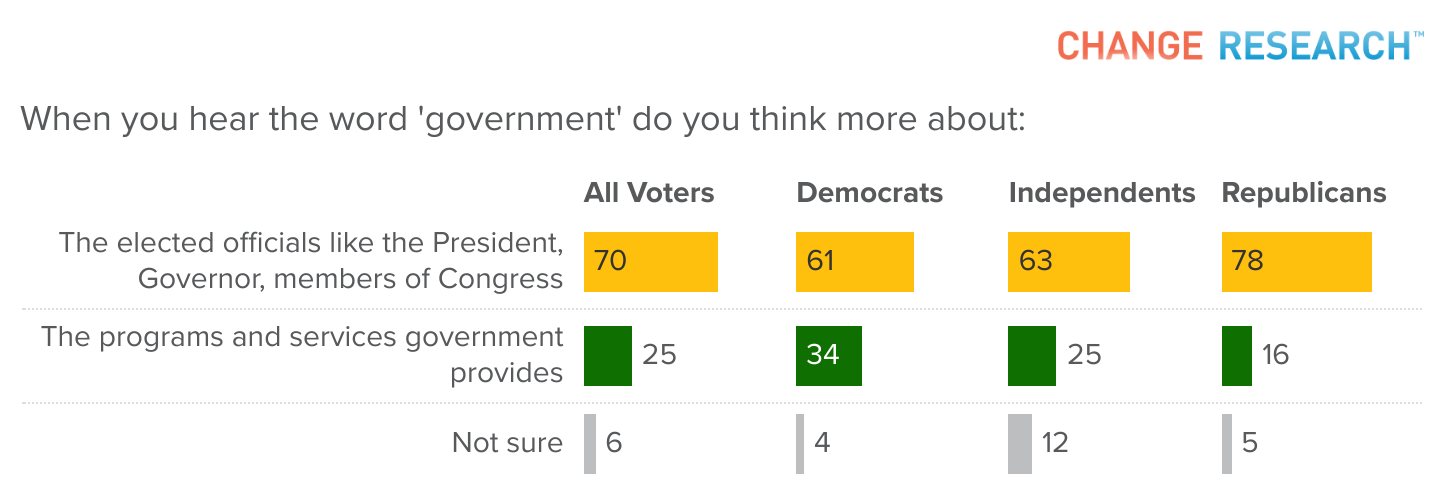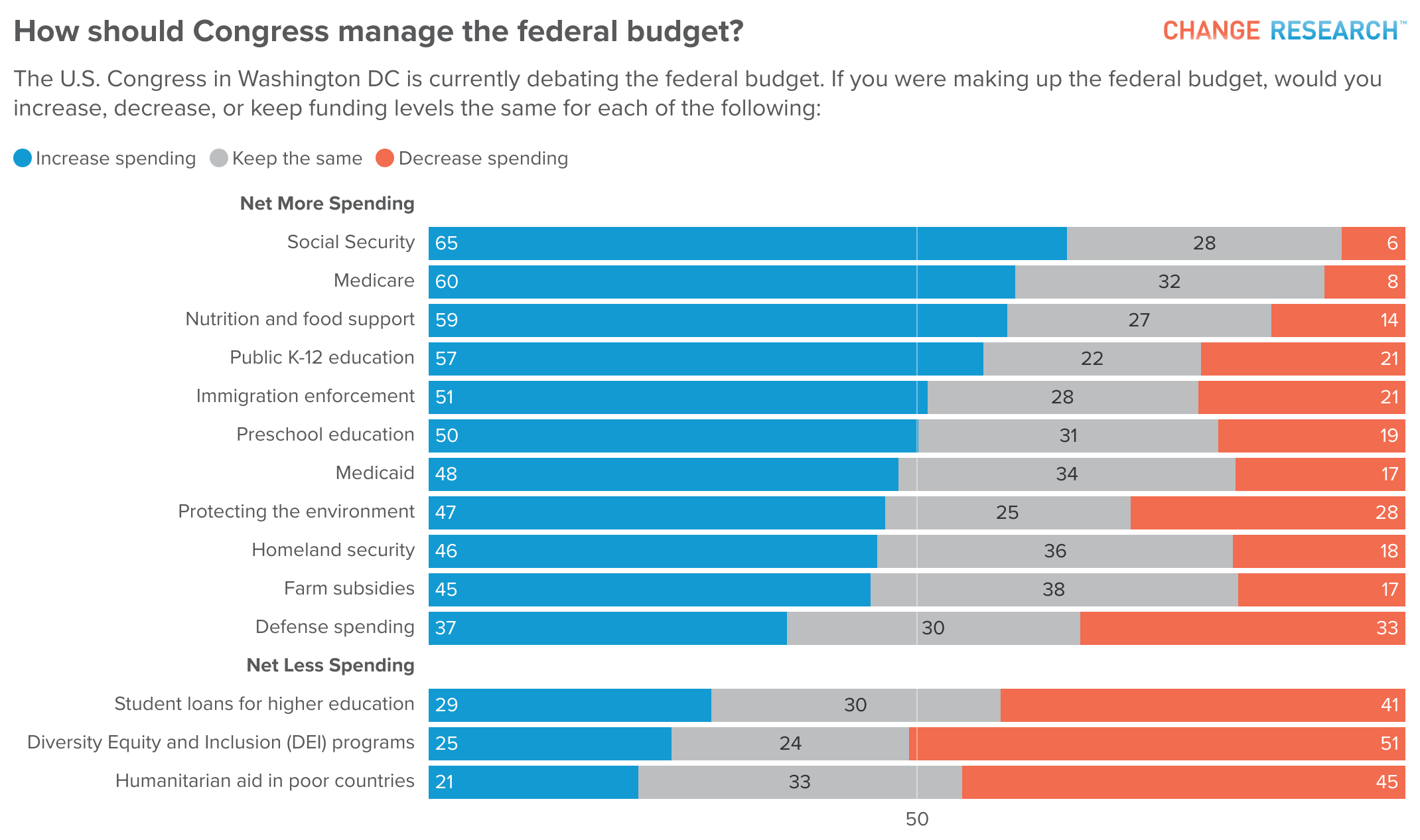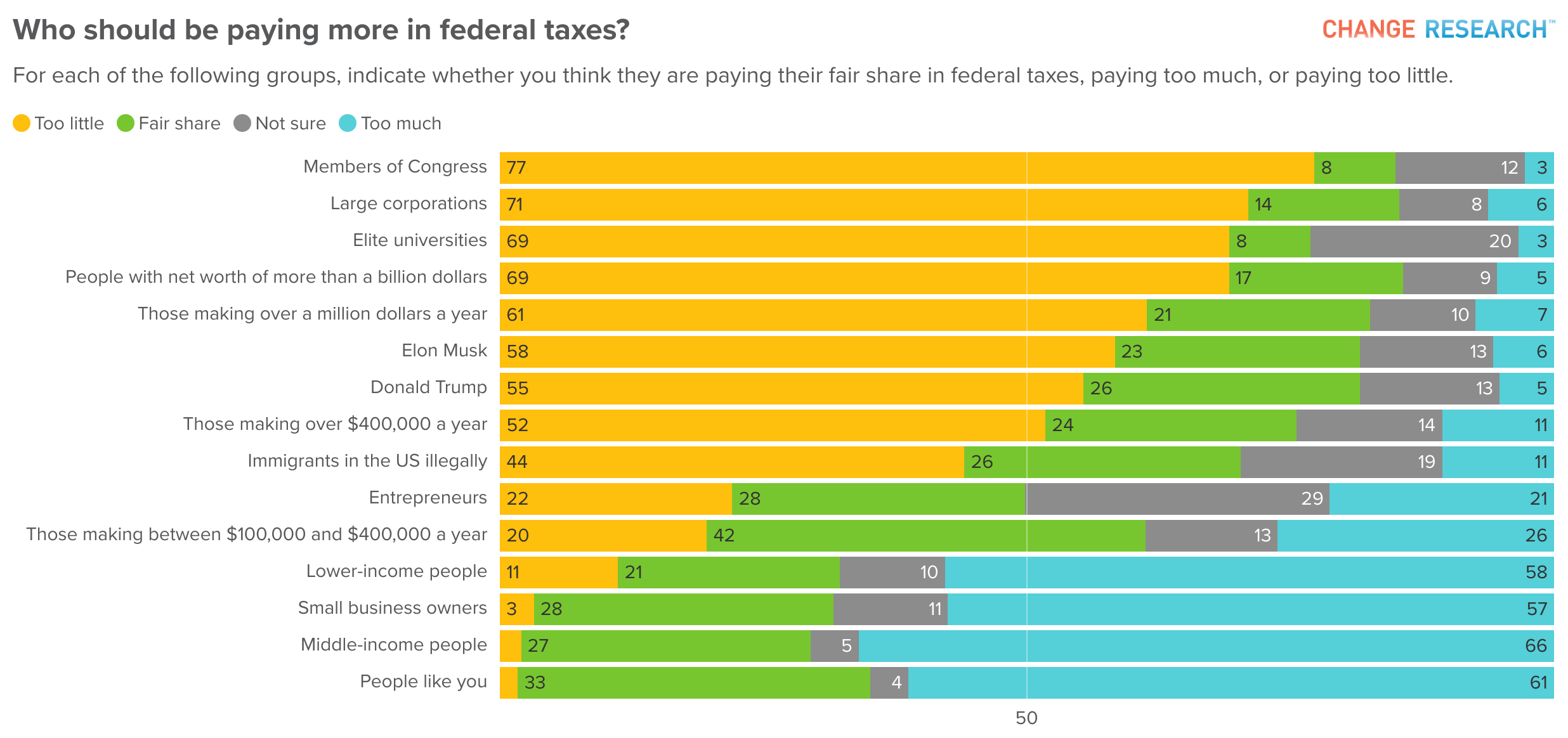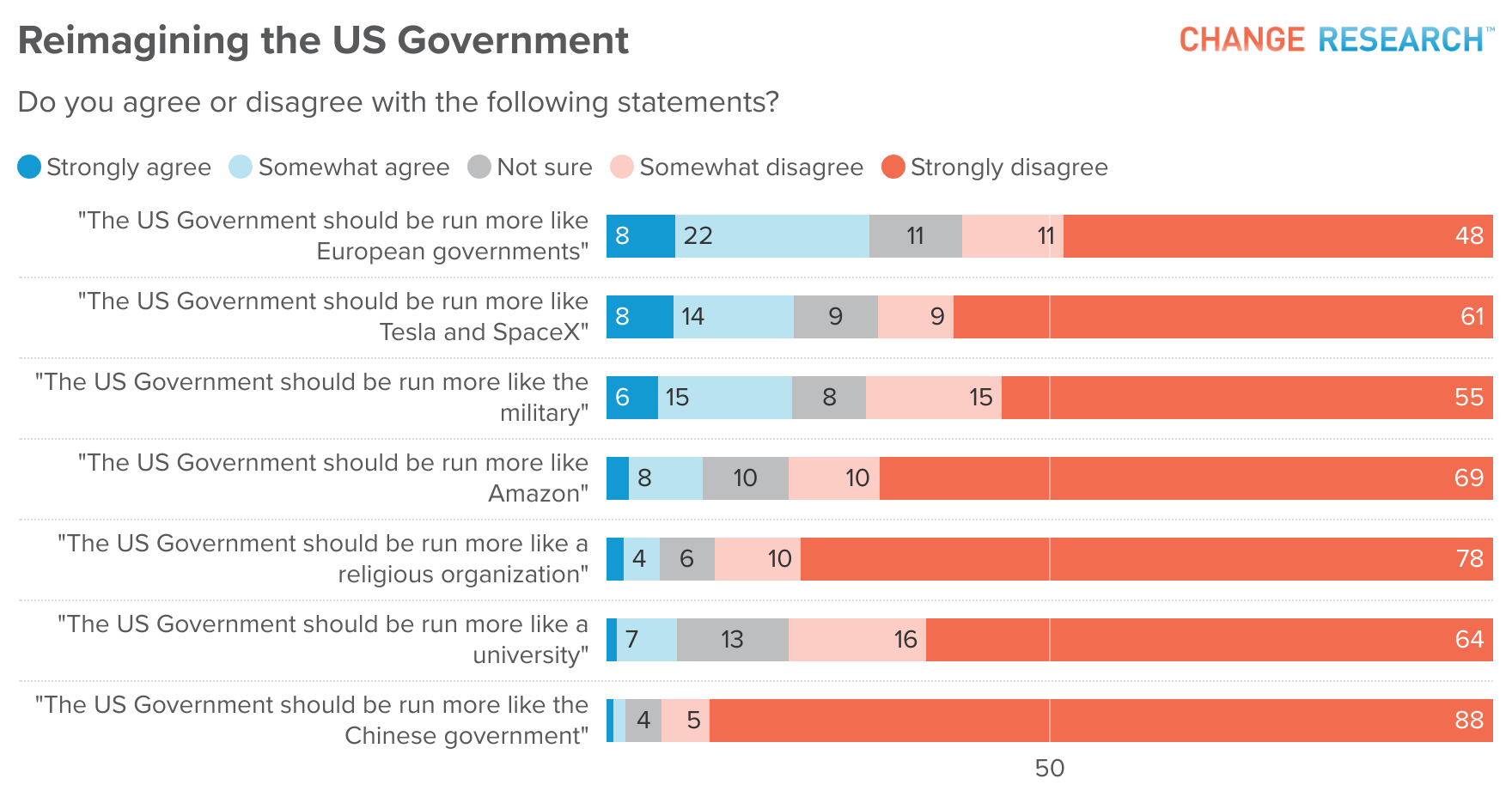Change Research polled 2,732 voters nationwide, between February 23-27, 2025, on public perceptions of government, federal budget priorities, and views on Elon Musk’s influence. The results reveal significant skepticism toward Musk’s role, deep partisan divisions on budget priorities, and broad dissatisfaction with the fairness of the U.S. tax system.
Public Perceptions of Government
Voters think of politicians when they think about “government,” far more than they do programs and the actual functioning of government. When given the choice, a majority (70%) think of elected officials, such as the President, Governor, or members of Congress, while just 25% associate the government with the programs and services it provides. This perspective is widely shared across the political spectrum, though Republicans (78%) are the most likely to equate government with politicians. Meanwhile, Democrats (34%) are more likely than Independents (25%) and Republicans (16%) to connect government with its functions rather than its players.

Federal Budget Priorities


Partisan disagreements are strongest around funding Diversity, Equity, and Inclusion (DEI) programs, humanitarian aid, and environmental protection. DEI programs face a stark net -26 rating, with 50% of Democrats supporting increases while 93% of Republicans favor cuts. Similarly, humanitarian aid has a net -24 rating, with strong opposition from Republicans (-76 net) but more mixed views among Democrats (+31 net). Environmental protection is another major fault line, with the majority (84%) of Democrats supporting increased funding but half (54%) of Republicans wanting cuts (net -42 among Republicans, +82 among Democrats).
At the same time, many voters favor maintaining current funding levels rather than making drastic changes. Among Democrats, pluralities prefer keeping spending the same for immigration enforcement (46%) and farm subsidies (45%), while majorities support holding steady on homeland security (51%) and humanitarian aid (51%). On the Republican side, pluralities say funding should remain unchanged for Medicaid (40%) and preschool education (41%). This suggests that while some issues spark strong partisan divides, there are areas where voters across the spectrum lean toward stability rather than expansion or cuts.
Tax Fairness: Who Pays Too Much vs Who Doesn’t Pay Not Enough?
Voters believe that several groups – including Members of Congress, large corporations, and elite universities – are not paying their fair share in taxes.

Majorities say that members of Congress (77%), large corporations (71%), and elite universities (69%) are paying too little in federal taxes. There is rare bipartisan agreement here – 60% of Democrats and 78% of Republicans believe elite universities pay too little, while 76% of Democrats and 79% of Republicans say the same about Members of Congress. Similarly, 78% of Independents believe that these entities are underpaying. However, while Democrats and Independents widely agree that large corporations are paying too little, Republicans are more divided. Instead, just the plurality of Republicans (48%) say they are paying too little, while a quarter say they are paying their fair share (27%).
We see similar trends when it comes to high-income earners. For example, 69% believe people with a net worth of more than a billion dollars are paying too little. Among Democrats, majorities believe those making $100,000-$400,000 (76%), over $1 million (90%), and those with a net worth over $1 billion (97%) pay too little. Republicans, however, are split, with pluralities believing these groups pay their fair share (42%, 37%, and 38%, respectively).
There is broader agreement on the tax burden for everyday Americans. 61% of all voters believe “people like them” pay too much in federal taxes, while 66% say middle-income people are overtaxed. This sentiment is shared across party lines, with 54% of Democrats and 69% of Republicans saying people like them pay too much and 62% of Democrats and 70% of Republicans saying middle-income earners are overtaxed.
However, differences emerge when it comes to lower-income people and small business owners. 76% of Democrats say lower-income earners pay too much, compared to 42% of Republicans. Conversely, 68% of Republicans believe small business owners pay too much, compared to 48% of Democrats.
On immigration, 76% of Republicans believe undocumented immigrants pay too little in taxes, while only 11% of Democrats agree. Nearly half of Democrats (49%) say they pay their fair share.
Finally, Republicans are less likely to believe billionaires like Donald Trump and Elon Musk pay too little — 52% and 46%, respectively, say they pay their fair share. In contrast, 96% of Democrats and the majority of Independents (69% and 70%), respectively believe the duo are not paying enough in federal taxes.
Elon Musk’s Role in Government
Despite the effects it has had, a slim majority of Americans accurately identify the role of the Department of Government Efficiency (DOGE) as an advisory panel rather than an official government department. Voters have varied understandings of DOGE, with the majority (57%) identifying it as a presidential advisory panel with no independent power granted by Congress. A significant portion (22%) believe DOGE is an official government department with broad authority, including access to all government and the ability to hire and fire federal workers. Democrats (64%) are the most likely to identify DOGE as an advisory panel, compared to 52% of Independents and Republicans. Republicans (32%) are three times as likely as Democrats (11%) to believe DOGE is a powerful government department. Independents fall in between at 21%. About a fifth (21%) of voters across all parties say it’s something else or are not sure.
Americans are generally skeptical of Elon Musk’s involvement in the government. A majority (53%) believe Musk is helping himself and his businesses, compared to 43% who think he is helping make the federal government run more efficiently and saving taxpayers’ money. While an overwhelming majority of Republicans (86%) believe he is focused on making the federal government more efficient, nearly all Democrats (97%) and a strong majority of Independents (69%) think he is primarily looking out for himself and his businesses.
Confidence in DOGE’s cost-saving potential is far from universal. Among non-MAGA Republicans, three-quarters (74%) believe DOGE will save a significant amount of money, compared to near-universal confidence (97%) among MAGA Republicans. Independents are even more skeptical, with a third (34%) expecting major savings and a net skepticism of -21.
Among Democrats, skepticism turns into outright rejection. The vast majority (82%) of Democrats believe DOGE will save little or no money, resulting in a net rating of -73. Among voters who voted for Trump but did not strongly favor him in 2024, 65% anticipate cost savings, compared to 98% of Trump’s strongest supporters.
Among Democrats and independents, 55% believe that Democrats in Congress can meaningfully block or influence Trump and Musk’s agenda if they make an effort, while 31% think there is little they can do.
How Should the U.S. Government Be Run?

Voters are open to the idea of government reform, but they are not rallying around any alternative models proposed. When presented with different systems the US Government could emulate, most are met with strong resistance. Just 6% say the U.S. should be run like a religious organization, while 88% oppose that idea (net -82). A government modeled after Tesla or SpaceX does not fare much better, with only 21% supporting and 69% opposed (net -48). Even Amazon finds little favor – only 11% support a government modeled on it, with 79% opposed (net -68).
Some partisan divides do emerge. Among MAGA Republicans, views on a military-style government are split: 46% support it, while 43% are opposed – making it one of the models with more support. A European-style system, meanwhile, receives more backing among Democrats, with half (54%) in favor and a third (33%) opposed. Still, only 30% of voters overall support such a system, compared to 60% who oppose it. As for a government modeled after China, voters are nearly unanimous in their disapproval, with just 3% supporting it and 94% opposing it.
